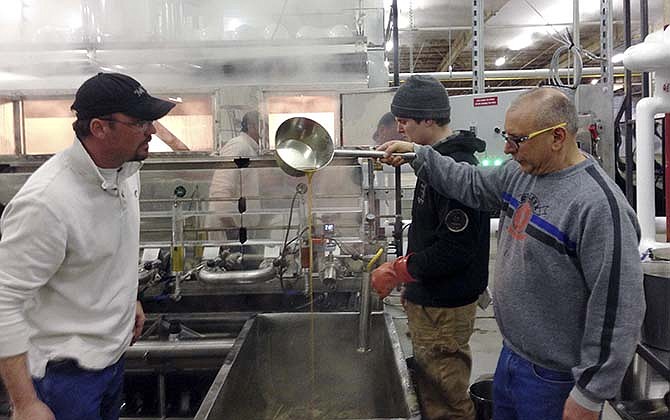ISLAND POND, Vt. (AP) - Already, Vermont is maple syrup capital of the U.S., with production traditionally being a side business for farmers. Could a large-scale operation, tapping into thousands of acres of maple trees in a remote northeastern part of the state, be as sweet?
This isn't the old galvanized-sap bucket-nailed-to-a-tree type of operation. This is industrial-sized maple. And companies know there's rising demand for natural sweeteners as consumers turn away from products made with high fructose corn syrup.
Sweetree LLC plans to become the biggest producer of the sticky-sweet stuff in North America. Though the operation has created full-time jobs in a poor region and says it will boost local producers by also buying certified organic syrup, the move has also generated some curiosity and concern from those in the maple business in a state that yielded $49 million worth of syrup in 2013.
The operation, backed by Wood Creek Capital Management of New Haven, Connecticut, chose northeastern Vermont because of the state's brand and large tracts of high-elevation land, which isn't as affected by climate change, Sweetree CEO Bob Saul said.
"Between climate change and the dynamics of Canada, there just aren't that many places in the U.S., let alone the world where you can make maple syrup for the next 20, 25 years," said Saul, who produces his own maple syrup at his home in Amherst, Massachusetts.
Sweetree bought 7,000 acres of forest land in Warren Gore and Averys Gore north of Island Pond, and has installed 95,000 taps in maple trees, with plans for 500,000 taps. That number would make it the largest operation in North America, according to Dave Chapeskie, executive director of the International Maple Syrup Institute in Spencerville, Ontario.
Saul won't say how much has been invested in Sweetree so far, except that it bought an 82,000-square-foot former Ethan Allen furniture plant and has 24 full-time employees - with plans to hire more this summer. Sweetree expects to sell some syrup in 2016 but plans to sell mostly maple-based products, even, perhaps, maple tea.
Some in the maple business are waiting to see what happens with the large-scale Sweetree production, and whether the operation affects their markets. "It's got to concern people," said Denise Marshall, of D and D Sugarwoods in Glover.
Ledge Haven Farm in Orwell sells all its syrup online and by word of mouth and says it's all about Vermont's reputation.
"There's a reason why they land in Vermont. And it's the brand that they want. If you're going to make a lot of maple syrup you want to make Vermont maple syrup," farm co-owner Tom Audet said.
Meanwhile, a Quebec company set up a maple factory in the same region last July to purchase more syrup from U.S. maple producers. Bernard and Sons, which belong to parent company Les Industries Bernard and Fils, bought 22,520 gallons of U.S. syrup last year - half from Vermont and some from New York, Pennsylvania, Michigan and Wisconsin.
Looking at consumer demand following negative publicity about high fructose corn syrup and genetically modified foods, Island Pond Maple Factory CEO Jacques Letourneau said the company hopes to increase the amount of syrup it buys in the U.S. over the next three to five years and then will consider opening a processing plant.
"People are starting to pay a little bit more attention to what they eat and that includes maple syrup because you look the back of a bottle of maple syrup and you read the ingredient list and there's only one," he said. "You look at back of some table syrups, I won't name anybody, you need a chemistry book to find out what it is exactly you're eating."
Matthew Gordon, executive director of the Vermont Maple Sugar Makers' Association, says the extra attention on Vermont will be beneficial to all producers.
"The more companies who are seeking to buy bulk syrup in the area should be a benefit to producers, as it creates more demand."

